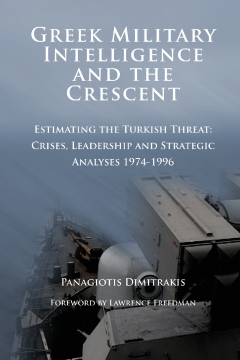
BOOK
Greek Military Intelligence and the Crescent
Dr. Panagiotis Dimitrakis | Sir Lawrence Freedman
(2013)
Additional Information
Book Details
Abstract
During the 1987 Greek-Turkish crisis, Greek military intelligence provided essential information on Turkey’s limited military preparations, so helping to prevent an escalation to confrontation. In the 1996 crisis, Greek military intelligence failed to provide tactical information and details of the Turkish intent to deploy troops on one Greek islet. This failure allowed the Turks to turn the tables on the Greeks. Greek Military Intelligence and the Crescent successfully draws together the crucial assessments made throughout each episode that defined the crisis-management styles of Prime Ministers Andreas Papandreou and Costas Simitis. Dimitrakis’s expert knowledge of the geographical and politico-military landscape reveals the complexity of the relationship between Greece and Turkey; two antagonistic NATO allies. The forward has been written by Sir Lawrence Freedman the official historian of the Falklands war and a member of the 2009 United Kingdom Iraq War inquiry.
Today, just as was the 1996, the interim Greek government is weak (distracted by the financial crisis), with the political leadership clearly undergoing internal challenges. And, on the Turkish side, Prime Minister Erdogan s health is the subject of persistent rumors, and the influence of powerful Foreign Minister Davutoglu seems to be waning due to the perceived failure of his zero problems with neighbors foreign policy brought on by factors like Syria s disintegration. The military, which sees itself as preserving secularism and which deposed the Islamist forerunner of today s AKP government in 1997, has been on the defensive since 2002, and could seize the initiative to return to power if internal political confusion arises in the government. The AKP s robust Ergenekon case against the military accused it of planning a provocation with Greece (among other things) to justify a military coup; though the veracity of this is still not clear, it shows at least that the Turkish establishment still sees the same dynamics as in the past believable enough to sell to their public. While many other factors in regional and global politics have changed since 1987 and 1996, it is thus clear that many have also stayed the same. If any new altercations occur between Turkey and Greece due to the traditional issues, intelligence practitioners and politicians alike would be wise to pay close attention to the tactical lessons presented in Greek Military Intelligence and the Crescent, as this might help to prevent past mistakes from happening again, and thus minimize the chances of needless conflict. - Chris Deliso, Editor, Balkanalysis.com
Chris Deliso
